
Breaking point: How a Green New Deal for Europe will save us from disaster
As apocalyptic, orange-toned images of the horrific wildfires raging across the western United States flood our timelines and front pages, it’s impossible to ignore the fact that climate breakdown is not some distant crisis that future generations will have to solve, but rather its flames are lapping at our doorstep, right now
A similarly orange-toned Donald Trump seems intent on denying the link between these fires and climate breakdown, blaming Californian “forest management” for the inferno, and wilfully ignoring both a record-breaking heatwave this summer and the hottest reliably recorded temperature in human history (54.4C). This comes as no surprise though, because to acknowledge the climate crisis is to acknowledge reality, a concept that Trump and his acolytes seem allergic to. The fact that the US emitted over 6.6 billion tonnes of greenhouse gasses last year or that over 150 million trees in California died due to drought in the previous decade didn’t warrant a mention from the president.
To those paying attention and willing to listen to science and reason, climate heating records are broken every single year, and a nightmarish cascade of natural disasters seems to regularly unfold across the globe
It may seem like a distant memory to some, after such a turbulent year thus far, but it would be impossible to forget the nightmarish scenes from Australia earlier this year, which killed or displaced an estimated 3 billion animals and scorched over 46 million acres. As Greta Thunberg said, “Our house is on fire”, and it is spreading out of control.
The fiery historian of fire and the man-made Pyrocene, Stephen J. Pyne has shattered a number of illusions surrounding wildfires, and offers an eye-opening comparison to a certain pandemic that has also spread “like wildfire” across the world this year. Much like COVID-19, wildfires are a biological phenomena which can spread exponentially, and while “good fires” and “good government” can mitigate some of the most ruinous effects of wildfires, unfortunately we will never be able to create a vaccine for wildfires. As long as fires remain a problem for someone else, particularly for those of us in temperate Northern Europe, it will remain easy for those in power to ignore these risks entirely, failing to draw a meaningful connection between our own reliance on fossil fuels and a world that is literally burning as we speak.
In the UK, our government has failed to meet 17 out of 20 UN biodiversity targets, and 1 in 10 of our animal species are facing extinction. As temperatures soar to new heights every summer it is highly likely that wildfires of the kind we saw last year will become an increasingly common occurrence, which will decimate what precious little biodiversity remains in the UK. Elsewhere in Europe, a perfect storm of rising temperatures, droughts and high density forests leave much of Spain, Portugal and Greece susceptible to fires, as we saw tragically in the 2018 Attica fires that killed over 100 people.
So what can be done to stop the seemingly inexorable sleepwalk towards an ecological cliff edge?
How can the politics of disaster capitalism even hope to protect us from climate breakdown? It is clear that nationalist and authoritarian governments are woefully ill-equipped to deal with any kind of natural disaster, judging by the behaviour of Trump, Bolsonaro et al. At worst, these leaders outright deny the existence of climate change. But even in the more moderate outposts of liberal politics we have seen a culture of hand-wringing but ultimately inaction on the climate crisis.
The failure of many countries to meet the terms of the 2016 Paris Agreement has been widely condemned, but without a mechanism of enforcement, each country is individually responsible for its own efforts to meet the relatively lax targets set. As such, it falls on responsible citizens to take matters into their own hands and urge their governments to tackle the climate crisis with the force it requires right now, rather than setting pathetic “net-zero by 2050” targets. Unfortunately for most of us, the neoliberal stranglehold on electoral politics has robbed us of the chance to take swift action against climate breakdown, with other more distracting topics creeping up the agenda.
Much of the discourse around climate breakdown activism has fallen outside of the realm of electoral politics
The zeitgeist of post-Occupy political protest has been seized by Extinction Rebellion (XR), who place direct and symbolic action against the climate crisis at the forefront of their agenda and are in the process of being classified as an “organised crime group” by the government. But with the group determined to distance itself from socialist movements, it seems that at their core are essentially capitalists with bicycles. To truly become a social movement, green politics must be related to the interests of the majority, and must recognise that neoliberal capitalism as it currently exists is incompatible with meaningful climate activism. To quote Chico Mendes, “environmentalism without class struggle is just gardening.”
However, a rare cross-party ‘Climate and Ecological Emergency Bill’ was tabled in the UK recently which aims to expand the remit of the 2008 Climate Change Act, setting more ambitious targets for climate breakdown and would force the UK to take responsibility for its true carbon footprint. The bill would put into practice some of XR’s demands, including the creation of a citizens’ assembly, selected randomly from the population, who would recommend measures for dealing with the crisis. The bill also facilitates a ‘just transition’ to a greener economy by providing sectors with high emissions and an unsustainable environmental impact with the financial support and retraining necessary for their repurposing. While the bill commands widespread support amongst opposition MPs, it is unfortunately unlikely that the Conservative government will allow it to be passed.
The fight for a Green New Deal for Europe will likely continue to be one that is waged from the opposition benches and in the streets and town squares across most of Europe
Ultimately, we face a stark choice: We can choose to remain complacent, happy to watch wildfires scorch the planet, hurricanes and floods leave millions homeless and rising temperatures create droughts causing mass migrations wars for scarce resources. Alternatively, we can take action in our homes, reducing our carbon footprint on an individual level, and more importantly we can demand our governments commit to back the Green New Deal (for Europe) and take serious action against the 100 companies that produce 71% of all the planet’s greenhouse gas emissions.
For action to be taken against climate breakdown, it requires all of us to understand that we must completely transform our existing economic system
A solution to a problem on the scale of climate breakdown must be on the same scale as the problem itself, so we must abandon the politics of austerity: A ‘balanced budget’ will not protect us from wildfires, droughts or flooding, but a programme of Green Public Works will decarbonise the economies of Europe and guarantee secure and sustainable jobs for all those who seek them, driving down working hours and increasing workers wages. An Environmental Union will also bind EU member states to an equitable framework that will share both the gains and burdens of this ‘just transition’. Finally, the Green New Deal will establish an Environmental Justice Commission to centre social justice and ensure no community is left behind, and will also force the EU to combat resource exploitation and inequality around the world.
If we are serious about tackling climate breakdown, we must stop viewing these wildfires as a curious outlier and horrific spectacle, but instead centre them in the rapidly unfolding disaster that will be far more dangerous to humanity in the long run than any single pandemic. We stand at a dangerous crossroads, and the safer path could not be any more clear.
Photo Source: SFGATE.
The views and opinions expressed here are those of the author and do not necessarily reflect DiEM25’s official policies or positions.
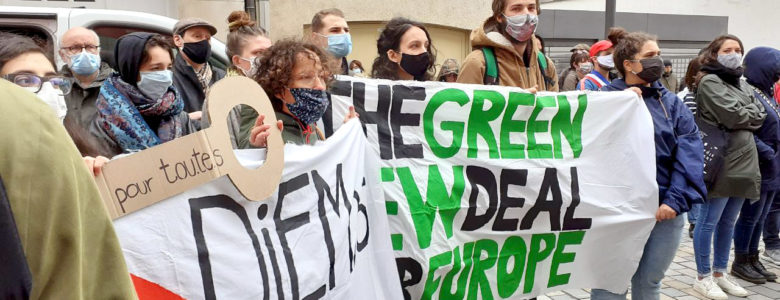
Waves of demonstrations for housing in Luxembourg
Can these waves of demonstrations spread through Europe and be the prelude to the first European Rent Strike?
In the early days of summer 2020 the mayor of Esch-sur-Alzette, Luxembourg’s second largest city tried to push forward a new city regulation to limit co-housing. Very quickly, the inhabitants of the city — among these members of DiEM25 Luxembourg’s local groups — petitioned for the mayor to remove this new regulation.
The case escalated as the collective called on the government to take a position on what they identified as an unlawful regulation. After reviewing the bill, the government confirmed that the mayor had no right to try and regulate how people want to live. The tension rose even higher when several witnesses testified under the seal of anonymity that municipal civil servants had been instructed to rid the city of “thugs”. Under pressure the mayor pushed back the vote on his regulation in the city council but refused to drop it. The collective then called for demonstration on the 26th of september.
As these events were unfolding, a report by the audit company Deloitte indicated that Luxembourg city has become the most expensive city in Europe, and that two other of its cities, Esch and Differdange, were ranked in the top ten most expensive cities of the European Union. Activists and tenants who had been warning for years that a housing crisis was underway were vindicated in their stance.
As a result, DiEM25 members from Luxembourg city local group contacted the newly formed tenant unions and other organisations proposing to organise a national demonstration for the right to housing.
DiEM25 activists part of Luxembourg local group protested as part of a coalition for the right to housing in the Grand Duchy.
Meeting on public squares, a coalition slowly took shape, and testimonies kept pouring in: “all human beings have the right to dignified housing”, Yara says. They included stories of people suddenly having to pay thousands of euros of extra charges, of safety deposits amounting to more than three months of safety deposits, of families of five crammed into a single bedroom with broken showers or toilets. The stories piled up and the housing crisis that had been going on for years suddenly erupted in the public space. The coalition took a stand and called for a national demonstration on 10 October, not two weeks after the demonstration in Esch.
We are now in early October, a few days away from the national demonstration on the housing crisis in Luxembourg. The first day in Esch was a success with a few hundred people braving the cold wind and the rain to show their determination. Now activists from the Tenant union, the left party, the afro-descendant association Finkape, the foreign worker association ASTI, both DiEM25 DSC’s and many others are canvassing several days a week to make the national call a success. Already, newspapers are filled with stories about and around the demonstration, making the hidden stories of housing precariousness plainly visible for the first time.
Now we as DiEM25, have to look further to avoid a worsening evictions crisis.
Rents have increased in nearly all EU countries in the last 13 years, and as result so has homelessness. Collectives for housing rights fear a ticking bomb of evictions when furlough schemes will inevitably end and the upper class will ask for a repayment of the enormous debt that is growing all over the continent to prevent an economical catastrophe.
When will this evictions crisis reach a critical point? This winter? Next spring? Next summer? Or is it already happening behind closed doors? What is undeniable is that somehow a struggle will take place. What is also undeniable is that if we organize now and stand ready, we have shot at turning the tide and at forcing the establishment to fight on a ground and time that we have decided on. Already, movements are coalescing around the issue of housing in countries such as the United Kingdom. The time has come for a Rentvolution!
Sign the petition for the legal right to cohabitate in Esch/Alzette: Pour le maintien légal des cohabitations à Esch/Alzette.
Sign our Europe-wide petition on the right to housing: Free low-income Europeans from rent burden.

The Belmarsh Tribunal: We stand with Assange
The Belmarsh Tribunal will investigate and evaluate US war crimes in the 21st century, and defend Julian Assange’s right to reveal them.
On Friday 2 October, the Progressive International (PI) will convene a planetary cast of activists, artists, thinkers, and political representatives to stand with Julian Assange in the fight for truth and justice against extradition to the United States.
M.I.A., Rafael Correa, Pamela Anderson, Lula da Silva, Rafael Correa, Roger Waters, Yanis Varoufakis, Slavoj Žižek and others to demand Assange’s release at Progressive International event.
The event will run from 0900-1200 EST, 1500-1800 CET, 1830-2130 IST
Register here!
Friday is the last day of witness testimony in Assange’s extradition trial.
The public event, titled ‘We Stand with Assange’, will take place online and will hear from musician and activist M.I.A, Pink Floyd’s Roger Waters, former president of Ecuador Rafael Correa, former president of Brazil Lula, former Greek finance minister Yanis Varoufakis, actor and activist Pamela Anderson, UK MP John McDonnell, philosopher Srećko Horvat, Assange’s lawyer Jennifer Robinson, former Argentinian diplomat Alicia Castro, philosopher Slavoj Žižek and many more.
The event, which takes its inspiration from the Russell-Sartre Tribunal of 1966, when representatives of 18 countries gathered to hold the United States accountable for their war crimes in Vietnam, will be live-streamed across numerous platforms and is now open to registration from the public.
Croatian philosopher and PI cabinet member Srećko Horvat, who will chair the event, said:
“In 1966 when no international authority dared to hold the United States accountable for war crimes in Vietnam, philosopher-activists Bertrand Russell and Jean-Paul Sartre gathered representatives from 18 countries to do it themselves.
Friday’s public event will put the United States government on trial for its crimes of the twenty-first century — from atrocities in Iraq to torture at Guantánamo Bay to the CIA’s illegal surveillance program — and draw attention to the extradition case of Julian Assange for revealing them, a case that will shape the future of publishing, journalism, speech, and democracy for decades to come.
Wikileaks has been an inspiration to social movements around the world. Now it is time for social movements to stand with Assange. Our collective freedom is at stake.”
Find out more about the Progressive International.
You can set a reminder for the livestream on YouTube and subscribe to their YouTube channel for more live events!
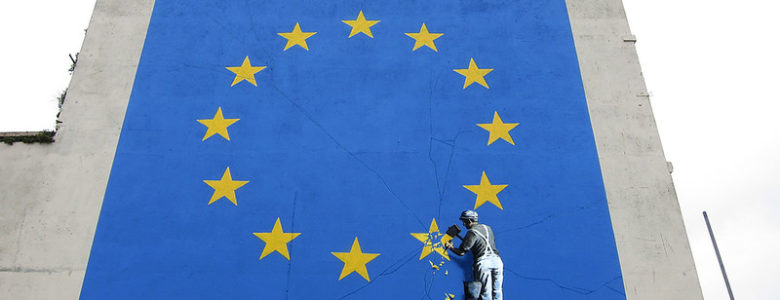
Diary entries on Brexit, defending refugees and writing postcapitalist fiction
Reading the newspapers last Monday, I was reminded that negotiations with Brussels are always an occasion for second-rate theatre.
Ultimatums are usually issued by EU negotiators facing UK governments that talk enthusiastically of red lines and sovereignty. But now, if the Telegraph is to be believed, it is Boris Johnson who has given the EU 38 days to propose a post-Brexit deal — or else.
While history is not on Johnson’s side, there is a difference between him and other premiers who buckled: he is not bluffing. It seems he would like a deal, but is not desperate for one. Let’s see how the EU deals with this in October, when trade talks are supposed to conclude. Setting aside this latest episode of the Brexit saga, I began preparing for a leaders’ debate in Greece’s parliament over our government’s handling of COVID-19. Our party, MeRA25, was not the only one to chastise the government for failing to hire extra doctors and nurses, leaving our national health service in a dilapidated state after a decade of austerity. However, I was the only parliamentary leader to absolve the government of incompetence and instead claim that it was its explicit policy to drive public health into the ground for a parasitic oligarchy seeking to privatise it.
Saddened and angered
Two days later, I awoke to the news that the Moria refugee camp on Lesbos had burned down overnight. Assembled in 2015, when nearly a million people passed through the island, it eventually became an EU-sanctioned prison camp, with 13,000 people packed in a space designed for 1,800. While at first they were free to move in and out of the camp, more recently the gates were locked shut.
In response to reports that refugees had started the fires intentionally to burn down the hideous camp, xenophobic yells filled the airwaves. Politicians, bureaucrats and commentators competed to find ways to condemn the “ungrateful” migrants. One minister said the state must not be blackmailed into providing better conditions, and that the refugees should be taught a lesson by being left to suffer in makeshift tents for months.
Saddened and angered by this cacophony, I posted the following in my blog:
“What would you do if you, your family and another 13,000 people were incarcerated in a prison camp built for 1,800 people, without running water, without heating, without knowing when you will be given a hearing to decide between deportation and asylum (some people have been in there for four years) and, to cap it all, you heard that 35 positive Covid-19 tests were returned in an environment where it is impossible to self-isolate and where there are zero doctors to look after you?
Would you not try to find a way to break down the gates so that you can escape the living hell? Would it be wrong to start thinking that maybe starting a fire is the answer?
No, you would be right. Indeed, it would be your duty to start that fire!”
Soon, the Greek media were reporting that the leader of MeRA25 was siding with violent foreigners against his own people. Funnily enough, I felt honoured to be on the receiving end of their venom.
Missing main characters
Tuning into Radio 4, I was greeted with the news that Boris Johnson had introduced his “rule of six”. Switching to Greek stations, I heard that hordes of officials and riot police had disembarked on Lesbos intent on “turning the screw on refugees”. I so wished the rule of six applied here too.
Trying to turn my thoughts elsewhere, I remembered that it was 10 September, the day my new book (Another Now: Dispatches from an Alternative Present) was released in the UK. Readers would soon be dissecting my first political science-fiction novel. Using that medium proved to be the only way I could do what I spent decades avoiding: sketch a plausible alternative to capitalism. What, I wondered, will people make of Iris, Eva and Costa, the three characters I conjured up to tell the story of how, after the financial crash in 2008, humanity built a type of democratic socialism — characters from whom I ended up learning so much and whom I now miss badly?
The weight of the past
Two awful anniversaries are marked on 11 September; images of the falling twin towers mix with echoes of the 1973 coup d’état that killed Salvador Allende and brought the Butcher of Chile into office. I met Chilean refugee friends at the University of Essex in 1979, and I remember the courage with which they hid their pain. Back in our strange times, the UK commentariat was going ballistic over Johnson’s manoeuvre to threaten the sanctity of his Withdrawal Agreement.
Has politics become unbearably dull? Or does the weight of these two anniversaries make it seem so? Before long, the Greek prime minister forced me to refocus. With our public health system and economy in tatters, he gave a speech to fan the flames of nationalism. Greece, he declared, would be buying fighter jets and frigates from France for billions, boosting our already unpayable debt. There we have it: a new arms race with Turkey, which Greece can only lose, is underway — and it will bring more austerity and sink our people deeper into debt bondage.
Entering post-capitalism
On 12 August it was reported that Britain’s economy was in its worst slump since records began as GDP fell by more than 20 percent over the first half of the year. Half an hour later, the London Stock Exchange shot up, the FTSE100 rising by more than 2 percent. The world of money had finally decoupled from capitalism. Money markets were divorced from profit. What we now have is a dystopian variety of post-capitalism. Maybe my book saw the light of day at the right time. Then again, maybe not.
This article was originally published in The Newstatesman on 16 September 2020.
Photo: Banksy Brexit mural over Dover.
Photo Source: dullhunk on Flickr.
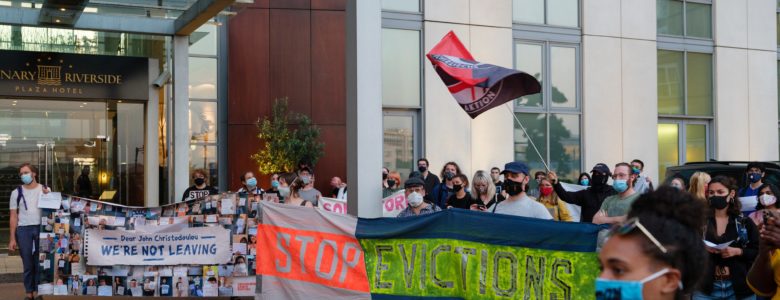
Solidarity and resistance: How renters are fighting against unjust evictions
With the second wave of COVID-19 sweeping through the UK like a tsunami, a number of key battlegrounds have emerged which are likely to define the future of the left for some time to come.
The fight for housing security, a basic human right of which many in our country have been robbed, has rapidly become a fight over the shape of civil society more generally, with fault lines appearing across the political spectrum.
As the right seeks to wage a culture war over anything from the Last Night of the Proms, to the ethics of snitching on your neighbours, the left are at the vanguard of the tenants’ rights movement, directly resisting evictions and shifting the tenor of public debate around housing more generally.
The ban on evictions which was introduced in March, at the height of the first wave of COVID-19 was a vital piece of legislation that not only protected thousands of people from homelessness, but made the concept of a “lockdown” actually workable, alongside the tragically temporary end of rough sleeping. As remarked by The Guardian, it was a cruelly poetic twist of fate that the end of the eviction ban should fall on the day in which the grim double act of Prof Chris Whitty and Sir Patrick Vallance addressed the UK warning of 50,000 new cases per day by mid-October.
As many as 55,000 people in the UK are estimated to have been served with an eviction notice since the start of the pandemic.
This means that the already overworked courts face an enormous backlog of eviction cases to deal with. Many tenants are unaware of their legal rights in the face of eviction, which calls the already shoddy ethics behind the entire eviction process into question and robs many judges of the chance to grant discretion in housing cases.
It seems absolutely perverse and reckless for the government to once again urge everyone to work from home if they can, but simultaneously work to undermine housing security for thousands of people. A Conservative election pledge last year was the abolition of no fault evictions, but the government has instead decided that those falling into arrears due to the pandemic should stop carping on and get a higher income or a more secure job. Meanwhile, Conservative generosity towards private renters has extended as far as a “Christmas truce”, banning evictions in the run up to Christmas — taking a leaf out of the Ebenezer Scrooge school of housing policy. Ultimately, the Christmas truce is an admission that the Tories and their landlord friends have been waging a class war against private renters for years.
Labour MP Zara Sultana has called for urgent measures to protect renters, highlighting the fact that 300,000 private renters have fallen into arrears during the pandemic, a figure that is highly likely to rise when the furlough scheme ends, currently propping up at least 5 million jobs. Sultana urged the government to extend the evictions ban for another year, cancel rent arrears and scrap no fault evictions. A coalition of organisations including Shelter, Crisis and Generation Rent have also urged the government to extend the eviction ban and offer a short-term package of emergency grants and loans to help renters who have lost income due to the pandemic.
Across the left in the UK, the protection of tenants has become a rallying point around which many groups have converged.
The rights of tenants and renters facing eviction have been picked up by Momentum as part of a widespread “resistance campaign” against residential evictions and a shift towards community-based action. Calls from John McDonnell MP for a “Marshall Plan-style” social housing recovery plan to build 100,000 council homes would go a long way towards elevating many out of precarious, expensive private rented accommodation, and would also create hundreds of thousands of jobs in construction and other industries.
Meanwhile, facing stiff competition for the title of “Worst Landlord in the Country” is John Christodoulou, the billionaire owner of Somerford Grove in Hackney. After campaigning for a rent reduction during the pandemic, residents were subjected to surveillance, harassment and threatened with legal action. The tenants, with the support of Generation Rent, the London Renters Union and Momentum now face immediate eviction, but to put it more accurately, they are now directly resisting their own eviction.
While the billionaire Christodoulou outright refuses to even meet with the tenants, the government and even the shadow cabinet have also neglected their duty of care and protection for renters. Shadow Secretary of State for Housing, Thangam Debbonaire MP was incredibly dismissive when asked why she opposed forgiving private rent debt, bizarrely claiming that it would benefit the rich.
There have been a number of victories in the UK for tenant activists to celebrate this year, such as the People’s Empowerment Alliance for Custom House (Peach) winning a 60% rent reduction and the right to live in council-managed properties. After four years of grassroots struggle, hundreds of families won the right to live in safe, secure and affordable accommodation. The London Renters Union have also been incredibly active in the capital, mobilising hundreds of members from disparate communities to resist evictions, preventing dozens of unlawful evictions over the summer. Acorn, a community-based union of tenants, workers and residents are also providing eviction resistance training for members as well as supporting direct action by members to resist evictions and win compensation from negligent landlords.
As we move into an uncertain future in which tenants are no longer protected by the eviction ban, it is likely that these unions and organisations will serve as a vanguard for many on the left who no longer see their views represented by the Labour leadership, but feel empowered to take matters into their own hands.
Looking abroad for inspiration and solidarity, it is possible to find evidence of the power of tenant’s rights organisations, but governments around the world are brutally allowing the eviction of thousands of people.
In the US, the situation of private renters is fraught, with up to 40 million facing eviction without a further stimulus package. Ominously, an “Uber for evictions” has been launched in the States, Civvl, who are anything but civil, call evictions the “FASTEST GROWING MONEY MAKING GIG DUE TO COVID-19.” However, in a demonstration of how tenant activism can have incredible outcomes, protestors across the US were able to secure an additional 4 month moratorium against evictions, buying time for an election and stimulus plan to be pushed through what will hopefully be a Democratic majority Congress. In Spain, the left wing Podemos coalition have frozen evictions until six months after the end of the current state of emergency. Other countries with more authoritarian governments have not seen this kind of support, for instance, thousands in Brazil have been evicted by force, and slums in Kenya were brutally demolished leaving their residents homeless during the pandemic.
Ultimately, the precarious existence of many thousands in private rented accommodation hinges on the actions of the government over the coming weeks and months.
If their complete rejection of a building safety bill based on the recommendations of the Grenfell fire public enquiry is anything to go on, the Conservatives simply do not care about private renters. In the face of this neglect, community-led organisations and unions are fighting in the streets to secure safe, affordable and secure housing, demonstrating solidarity with their neighbours and standing up to heartless landlords. The fight will be long and difficult, but in the words of Vijay Prashad, “as long as you are resisting, you are not defeated”.
Photo Source: London Renter’s Union on Twitter.
Read Benjamin James Davies’ article ‘Britain’s COVID-19 Housing Crisis’.
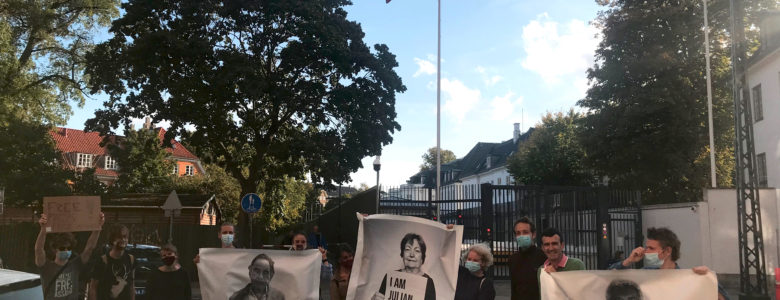
Protest against the extradition of Assange in Copenhagen, Denmark
The local DiEM25 group in Copenhagen gathered on September 24 at Fælledsparken, to march and protest for the freedom and integrity of Assange and all other journalists and whistleblowers who are faced with arbitrary imprisonment and fear for their life.
Around 15 activists gathered at the entrance of the park. From there, we marched to the British embassy in the district of Copenhagen, equipped with banners and protest chants such as
“This trial is a mess, for the freedom of the press”
“Freedom and justice for Julian Assange“
In front of the British embassy, we stood together in solidarity with Assange by chanting for his freedom and dignity.
Following a minute of silence, the group decided to read out a letter of concern — listing certain demands, such as the release of Assange from prison — addressed to the British ambassador, which was later handed over to the secretariat of the embassy.
Following the first assembly in front of the UK embassy, the activists moved over to the US embassy to repeat their protest action and chanting, which ended with a short photo-op. Unfortunately the US secretariat was not interested to receive a letter and rejected our demand to speak to an official representative.
After two hours of protest and marching, the group terminated the day with a brief presentation and why-you-are-here circle, which led to the decision to repeat the protest coming Thursday.
As Nils Melzer, the UN special Rapporteur on torture has posited:
“A murderous system is being created before our very eyes”
This is why it is of utmost importance to join such protest and to keep in mind that the freedom of press is under attack. Showing presence and solidarity in front of state-related institutions, such as embassies, can lead to important moments of attention, where certain demands can be raised, in order to reach the designated goal — namely the immediate release of Assange.
Letter to the ambassador.
“Julian Assange, founder of Wikileaks, has been imprisoned since April 11th last year after spending 7 years in political asylum in the Ecuadorian Embassy. On Monday the 24th of February, the extradition hearings began with the ultimate goal to deliver Assange to the US, where he will face 18 federal charges for obtaining and disseminating secret materials from the US military. Today, 7 months have passed, ever since he first trial has started. Assange’s situation and health condition remain dramatic. He is still facing arbitrary extradition and punishment. Moreover, Assange is standing on the brink to suicide, as has been assessed by various doctors and experts.
Over the course of the past years, Assange has been confronted with a massive public campaign, branding him as a sexual predator and rapist and characterizing him time and again as a pathological narcissist and liar. As we know today, these allegations have been deliberately constructed to destroy his public image and suppress his work exposing state secrets including war crimes, mass surveillance and routinized torture practices.
We are deeply concerned for the life of journalist and Wikileaks founder Julian Assange, who has been in critical health and extradition custody in the British high-security prison Belmarsh for over a year. We support the call by the United Nations Special Rapporteur on Torture, Nils Melzer, for the immediate release of Julian Assange for medical reasons and for reasons of the rule of law.
We remind the British media, politicians and other public figures that Assange is one of theirs and that the defence of press freedom is a fundamental issue of democracy. Notwithstanding the accusations made against Assange, we urge Britain, on the human rights and medical grounds mentioned above, to release Julian Assange from prison immediately so that he can recover under specialist medical supervision and exercise his fundamental rights without hindrance. Today, we stand up against this smear campaign and demand the ultimate stop of the extradition of Assange to the US. We are not alone in putting this message forward.
As part of an international network of activists from the civil society (“Don’t extradite Assange”), we assemble on this day and every other day all over the world and we demand justice for Julian Assange and all other whistle-blowers, journalists and political activists that are unjustly imprisoned, prosecuted repressed and/or murdered by government authorities, due to their courage of using freedom of speech to condemn corrupt and murderous political systems all around the world.
Freedom and justice for Julian Assange!”
Assange’s freedom is our freedom!
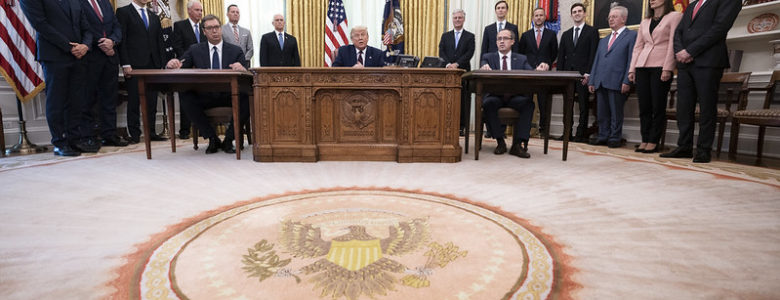
Next year in Jerusalem: The Serbian Embassy and Kosovo go on pilgrimage with Trump
On September 4, Serbian President Aleksandar Vučić met with the PM of Kosovo Avdullah Hoti in the White House, in the presence of Donald Trump, to sign the “Economic Normalisation Agreements between Belgrade (Serbia) and Pristina (Kosovo)”
Trump celebrated Hoti and Vučić as “brave men” for signing the “historic” trilateral agreement. Closer analysis reveals this “historic” encounter as yet another PR gimmick of Trump’s in the runup to the US presidential elections. In a sense, perhaps this serves a purpose similar to the grandiloquence surrounding the recent Israel-UAE peace deal, which the NY Times Thomas Friedman called “an earthquake” for Peace.
According to the text of the treaty, the most radical section calls for a moratorium, during which Pristina and Belgrade will both stop their tireless lobbying either for or against an internationally recognised status of Kosovo–for one year.
Procrastination does not solve anything, but it will help the Washington policy hivemind to not think about the Balkans, and will simplify the first troubled year of a possible second term of the Trump administration (also “an earthquake” but in a more calamitous sense than cheerleader Thomas Friedman intends).
Upon closer scrutiny, the logic of the agreement falls apart. Amounting to a random hodgepodge of promises and obligations, it looks more like the Trump administration’s Christmas wishlist for that corner of the Eastern Mediterranean, rather than a coherent document. Recognisable “Art of the Deal” style points include a ban on 5G equipment sold by “untrusted vendors” (Trumpcode for China); as well as a surprisingly more Obama-like campaign to further the decriminalisation of homosexuality.
A crucial part of this ornamental treaty also covers relations between the Middle East, Serbia and Kosovo
For example, the agreement states that Kosovo (home to a predominant 88% Muslim population) and Israel agree to “recognise” one another’s legitimacy, while Serbia is encouraged to move its embassy in Israel from Tel Aviv to Jerusalem by July 2021, shadowing the Trump administration’s historic Jerusalem syndrome. This latest bold and insulting provocation has understandably earned vocal reactions from EU officials. And yet, these same condemning EU officials appear weaker by the moment in their collective failure to enforce disciplinary action on profligate EU members such as those composing Visegrad group, or to muster an EU foreign policy in toto.
In addition, both Kosovo and Serbia pledge to label the Hezbollah movement and Lebanese parliamentary party as a terrorist organisation, to be confronted on any territory under Serb or Kosovar jurisdiction. In short, a hope for more division and international involvement by the East European periphery in the volatile Syrian conflicts,in which Hezbollah became embroiled well before Trump’s presidential tenure. The POTUS here takes up the Republican foreign policy tradition summed up by Craig Unger’s 2004 book House of Bush, House of Saud, demonstrating Western willingness to get further embroiled in Sunni-Shia feuds, consequences be damned. Trump also makes the more predictable gestural politics of indulging Israeli fantasies of recognition” by Muslims of Israel’s continued occupation of the West Bank, East Jerusalem and Gaza.
A simple question arises: Middle Eastern politics bear little relevance to the Belgrade-Pristina scenario, so, why did Washington incorporate the Middle East in this document?
By forcing Kosovo to “recognise” Israel, and to un-recognise Hezbollah as anything other than a nemesis, Trump seeks to kill two birds with one rock. Firstly, the deal lays out the blueprint for a “diplomatic wall” isolating Kosovo from other Muslim majority countries and Islamic republics. Second, it intends to further the interests of Trump’s and the US Republican establishment’s friends and clients–foremost among these the emirs of the UAE and Saudi Arabia, who campaign avidly to promote their Wahhabi version of Islam, by way of Wahhabist sectarian propaganda, and its derivative product-lines in former Yugoslavia among the Muslim communities in the Balkans. Trump may not understand the complexities of the latter cultural warfare in the region. However, he fully understands the need to keep the UAE as well as Netanyahu satisfied as regional clients, with whichever bargaining chips easily present themselves.
Kosovo announced its independence in February 2008 — under the beginning Obama’s tenure, a Democrat like Clinton (the co-director of the 1999 NATO bombing of Belgrade) and therefore a relatively predictable backer of the burgeoning new Balkan state. By negotiation of largely ornamental peace-deals between lilliputians in the Balkans or the UAE and Israel, Trump hopes to secure a status of ‘peacemaker’ to brag about in the debates, while also claiming to resolve foreign policy fiascos attributed to the Clintons’ legacy.
Nevertheless, there are a few complications.
For one, Serbian president Vučić had no constitutional right to sign such a treaty. Under Serbian law and procedure only the Prime Minister can do that. For Serbia, a ludicrous “Anti-Hezbollah alliance” represents one of many more self-humiliating steps made towards securing membership in NATO even though the vast majority of its population opposes any Serbian involvement in NATO which remains widely despised in Serbia. This makes Vučić’s stunt doubly anti-democratic.
Understanding the logic of transplanting the Serbian embassy to Jerusalem requires going back to 2017, when Trump “recognised Jerusalem” as the Israeli capital. By doing so, he had made the world fear yet another war. Such boldness also made the US ambassador to Israel one of the world’s loneliest ambassadors, since (despite the copycat promises of countries in the Visegrad Group to do the same) only the Guatemalan embassy dared to follow suit in leaving Tel Aviv. But now Vučić has come round to ensure that the US embassy shall not stand alone. Lacking any sense of irony — seeing as the US embassy needs Serbia to defend it — he signed a paper which he may not have read in its entirety, and to which he desperately added passages at the last minute before, during and after signing. In all likelihood Kosovo will do the same.
Though both the Israeli and Palestinian political establishments have long wanted their capitals in Jerusalem. Tel Aviv for the sake of peace remains the internationally recognised Israel capital city, even after the June 1967 “Six Days War” (which ended up lasting 63 years and counting) and the Israeli seizure of East Jerusalem, Gaza and West Bank, acts still recognised by the UN and international legal entities as violations of international law and obstacles to peace, ensuring the Palestinians a stateless and isolated existence.
And yet it seemed Kosovars and Serbs did not have enough problems.
For the general populations, the Kosovo-Serbia moratorium agreement offers a lose-lose with lasting negative international consequences
Peace remains far from the horizon for Belgrade and Pristina: both are economically ruined, politically voided and ruled by corrupted oligarchies eager to help the USA. Apparently, ex-Yugoslavian elites find in Trump an oligarchical face they can relate to. But Vučić’s faux pas only helps his country to a diplomatic crisis with the EU, China and Russia. Kosovo’s move has also struck very off-key notes among allies in the Arab-Muslim world.
The two “brave men” (as Trump anointed them) epitomise all that rots in international politics: cronies signing onto a deal that, predictably, benefits only the Empire that forced them, this time led by a celebrity whose famous handbook The Art of the Deal advises the reader on how to “screw” every other party.
There are no easy solutions for regional disputes that can conveniently work as gimmicks in November’s forthcoming imperial elections. Clearly, the long legacy of the US and NATO have only contributed to political spectacle and increasingly damaged the Eastern Mediterranean since the events preceding the Clinton-led NATO bombing of Belgrade. The Serbia-Kosovo peace process now needs a transparent democratic process, forgoing the usual self-appointed mediators. Such a process should strictly apply international law, ideally under UN supervision.
Aleksandar Novaković is a historian and dramatist. He is a member of DSC Belgrade 1 and the thematic DSC Peace and International Policy 1. Arturo Desimone is an Aruban-Argentinean writer and visual artist, currently based between Argentina and the Netherlands. He’s also member of DiEM25’s thematic DSC Peace and International Policy 1.
This piece was first published in Balkanist.
Photo Source: The White House on Flickr.
The views and opinions expressed here are those of the author and do not necessarily reflect DiEM25’s official policies or positions.

Radical internationalism in the face of climate breakdown: Why we need a Global Green New Deal
As plagues of locusts, nightmarish infernos and a deadly pandemic sweep the planet, it has become easy to slip into despair in the face of the immense challenges facing humanity.
Even the Doomsday Clock has had to switch to measuring our proximity to armageddon in seconds as opposed to minutes, with the twin threats of nuclear war and climate destruction leaving us 100 seconds from doom.
In the face of such unprecedented challenges the neoliberal establishment have retreated behind a nativism that seeks to preserve the status quo as they bury their heads in the sand when it comes to tackling the imminent threat of climate disaster. Some piecemeal proposals have been made in the name of international cooperation towards averting climate catastrophe, such as the European Green Deal, a lumbering effort towards a carbon-neutral European Union which promises to offer too little, too late.
In the midst of this nadir of international cooperation, the Progressive International (PI) held its inaugural virtual summit on 18 September.
Aiming to “unite, organise and mobilise progressive forces around the world”, the PI offers a much broader scope than other internationalist organisations across the political spectrum, and underscores humanity’s now looming stark choice: “Internationalism or Extinction”.
With keynote speeches from Yanis Varoufakis, Naomi Klein and Noam Chomsky, the inaugural summit covered a wealth of topics, from how to reclaim the world post-Covid, a blueprint for radical democratic internationalism that doesn’t ignore provincialism, and ultimately the urgent need for a Global Green New Deal.
The necessity for progressives around the globe to cooperate could not be any clearer; recent years have seen a perverse reactionary nationalist international that has positioned itself as the “true opposition” to the corrupt neoliberal establishment which pushed “business as usual” in the face of unprecedented economic disaster and climate disaster. This illusory struggle between liberalism and proto-fascism has made it impossibly difficult for true progressives to be heard above the din, meaning that so many opportunities to arrest rising inequalities and undo some of the damage of climate destruction have been missed.
To put their words into action, Yanis Varoufakis urged attendees to adopt a “common program and an uncommon collective action plan”, offering a blueprint for collective action that will enable cooperation on an international scale without ignoring local issues. At the heart of this blueprint is the Global Green New Deal, a synthesis of existing programs that will offer a more radical, coherent vision in the face of climate disaster.
This deal will offer a roadmap out of austerity towards a greener future, adopting many of the ideas of the Green New Deal for Europe, championed by DiEM25. The adoption of zero-carbon infrastructure and the centering of green, dignified and well-paid jobs must be central to this Global Green New Deal, and this will also require progressives to coordinate the distribution of costs and benefits between the Global North and South.
The recognition that socialist struggles against inequality are inextricably linked to the fight against climate disaster is one that many progressives must be forced to reckon with.
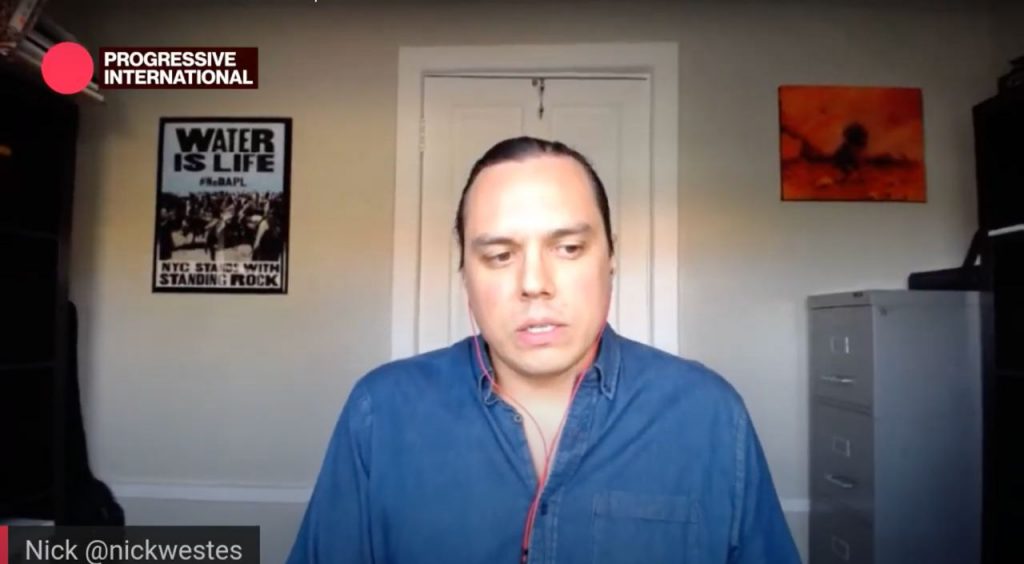
Nick Estes, co-founder of The Red Nation, an organization dedicated to Native liberation, speaks during PI Inaugural Summit panel discussion ‘A Progressive Vision of Post-Capitalism’.
As long as the world’s richest 1% create twice as many CO2 emissions as the poorest 50%, socialism is the only alternative to a reactionary, climate-destroying authoritarianism, as Vijay Prashad reminded attendees. Similarly, Lakota historian Nick Estes spoke of the urgent need to decolonise the atmosphere and offer an earth-centric, rather than anthropocentric blueprint for humanity. While Indigenous peoples make up less than 5% of the Earth’s population, their stewardship protects around 80% of the planet’s biosphere. The Amazon rainforest, which serves as the lungs of the world, is in grave danger, and Indigenous activists are the most vital line of defence against irreparable climate disaster.
Any Global Green New Deal must incorporate Indigenous leadership, inspired by the Cochabamba conference of 2010 and the climate courts which it called for. It is vital that the Global North creates atmospheric space for the Global South through the reduction of and absorption of their emissions, assuming the costs of transfer technology transfer, opening their borders and paying off their climate debt through land restoration.
Naomi Klein offered her vision for the “Years of Repair” that will inevitably follow the current COVID-19 crisis.

Discussion during PI’s Inaugural Summit panel session ‘The Years of Repair’ with Naomi Klein, Tasneem Essop, Vanessa Nakate, Aruna Roy, Carola Rackete, and moderated by David Adler.
She posited that the pandemic can serve as our “teacher”, granting us the time and space to reassess the lop-sided priorities of our pre-COVID lives. On an individual level, Klein said that this crisis has given us pause to question our overconsumption, and demonstrated to us that nobody belongs in warehouses, prisons, meat packing plants, detention camps or factory-like old age homes where the virus spread: “Places where human lives were already sacrificed, human machines for extension of profit.”
The Global Green New Deal must be the cornerstone of these Years of Repair. For those of us who wake up every day to stories of a burning, broken world, the Progressive International and the Global Green New Deal offer us an imperative that disparate forces around the planet can unite around, sharing stories of a collective purpose and collaborating towards a just and equitable transformation. In the words of Klein herself,
“By being willing to look at our state of brokenness there is the room for grief and care for one another.”
The absolute imperative need for compassion, solidarity and love in the face of climate destruction and the collapse of liberal democracy could not be any greater, urged Noam Chomsky in his keynote speech. Progressives everywhere must work together to rebuild (or in some cases, build outright) a vibrant and well-informed democracy. Echoing the calls of some of the world’s leading climate scientists, Chomsky urged us to panic. People around the world are simply not doing enough, and we are cursed with the worst leaders at the worst possible time.
A Global Green New Deal would demonstrate that the means to alter our course and avert this crisis are available right now, but not for long.
One of the primary aims of the PI must be to ensure that we “panic now and act accordingly.” Dr Cornel West also made the urgent plea for progressives to fight against extinction “with a smile on our face”, tackling the twin crises of complicity, complacency and cowardice in the political and intellectual classes.
Progressive internationalists working towards a Global Green New Deal must panic, but in a controlled, meaningful and decisive way, urged John McDonnell MP, former UK Shadow Chancellor. The current pandemic has lifted the veil over many, exposing the crippling failures and weaknesses of the neoliberal system which is destroying the planet. Decades of austerity following the 2008 crash in the UK and further afield have left public services stripped to the bone and unable to deal with the pandemic, meaning that few have any confidence their ruling classes will be able to take decisive action against climate destruction.
Progressive political parties such as Labour in the UK must make a Green New Deal central to their political program, rather than offering a “Britain First” rhetoric. In the face of extinction, internationalism and socialism are the only alternatives, and the Progressive International offers a blueprint for a radical, democratic Global Green New Deal which will save our planet.
Photo source: GEO.

Protest against the extradition of Julian Assange in Bonn, Germany
“Brave whistleblowers and investigative journalists are essential building blocks of our democratic societies.”
DiEM25 continues to show that democracy is one of its core beliefs by not only covering Julian Assange’s extradition trial and pointing out the case’s implications for our democracies, but also taking a stand in the streets against this latest attack on the free press by the Trump administration.
As former Brazil President Lula notes, Assange’s only crime was exposing war crimes committed by the US military in Iraq and Afghanistan:
“No one who believes in democracy can allow someone who provided such an important contribution to the cause of liberty to be punished for doing so. Assange, I repeat, is a champion of democracy and should be released immediately.”
John Shipton, Assange’s father, spoke about the terrible conditions his son has had to endure during his detention in a recent interview published by the Progressive International; a joint initiative between DiEM25 and the Sanders Institute to form a coalition progressive forces around the world.
In a show of solidarity, our local group in Bonn, Germany organized a protest demanding the protection of our freedom of the press, a vital requisite in any functional democracy.
The protest took part in front of the city’s famous Beethoven monument at noon where multiple people approached our members to find about this attack on the freedom of the press, what has been the response from our governments, and what they could do to help fight this injustice.
One passerby who expressed her support for the release of Julian Assange said she contacted local groups about the extradition trial but was disappointed when she found out they were not taking any actions. After a short discussion with our members, she decided to join us in solidarity (shown in the picture wearing a hat).
One of the organizers of the event, Yunus Arikan, said the following:
“Brave whistleblowers and investigative journalists are essential building blocks of our democratic societies. Julian Assange in the world and Müyesser Yıldız along with OdaTV in Turkey are the best of their classes. And yet, they are both threatened to death, which should be slammed and resisted by all progressives. As the members of the transnational movement DiEM25, I am proud to stand with my comrades in Bonn to call for freedom of Julian Assange, Müyesser Yıldız and under their name, of all brave whistleblowers and investigative journalists around the world.”

As Noam Chomsky correctly points out, should we let our governments decide what journalists can or can’t publish?
Although Julian Assange’s trial is a high-profile one with some coverage in the mainstream media, other journalists suffering the same faith barely get any attention. Such is the case of Müyesser Yıldız, a Turkish journalist, who is currently imprisoned for her investigative work.
If you, like us, believe journalists should be protected to do their jobs without state censorship we invite you to stand in solidarity with us by talking about these injustices with your family and friends and by signing this petition. Thank you.
#FreeAssange
In solidarity,
DSC Bonn